
November 9, 2024
Gabi Starr suspended 12 students for being a ‘danger to the community.’ Two of the students want you to know who they really are.
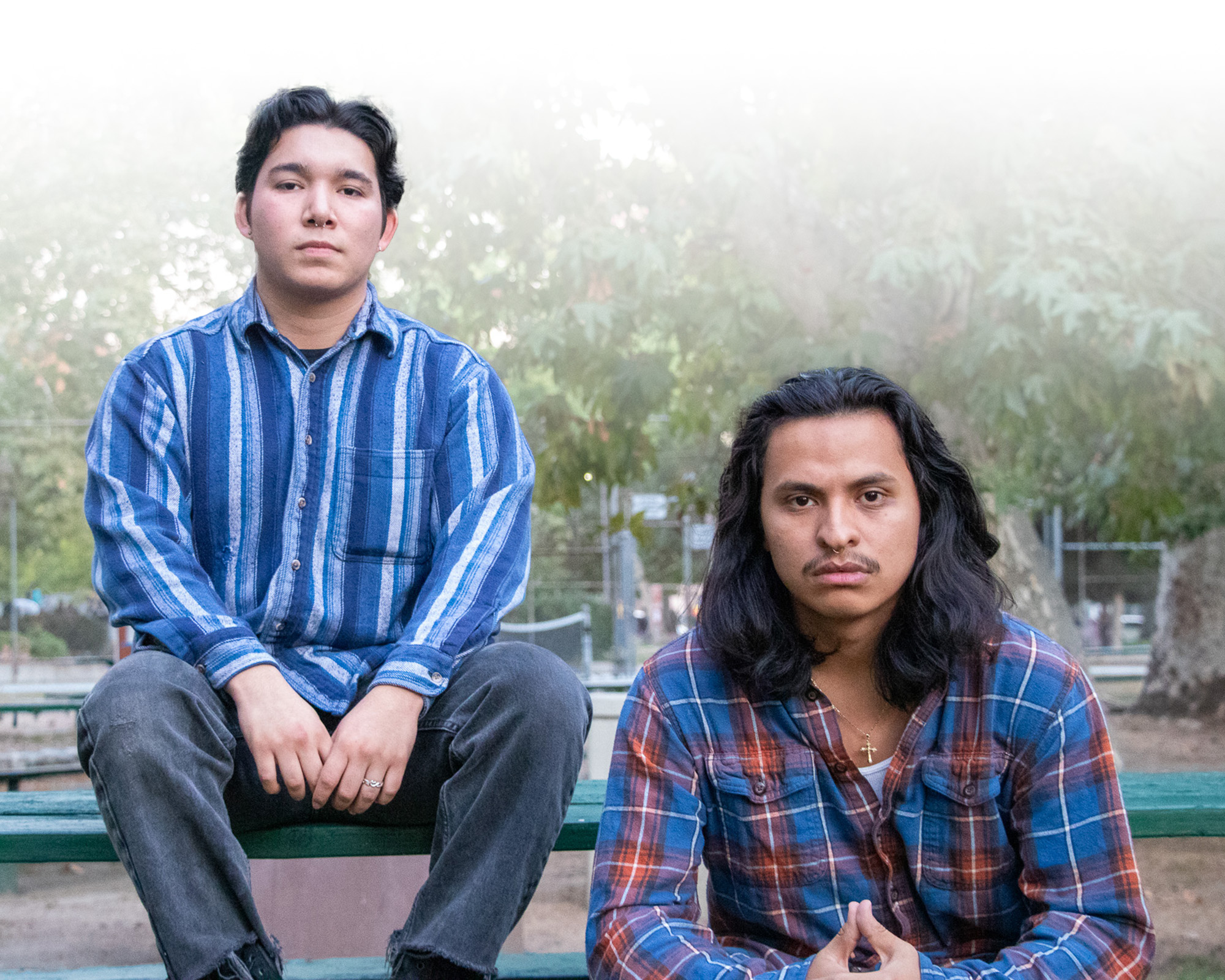
Daniel Velazquez PO ’25 was set to graduate from Pomona College this year as a Chicana/o-Latina/o Studies Major. Widely known on campus as DJ Danster, Velazquez did freelance DJ gigs on and off campus throughout their time at Claremont to afford tuition.
Now — without any formal hearing, and initially without any evidence — Pomona College has suspended Velazquez for the full academic year, for their alleged participation in a divestment protest on Oct. 7, 2024.
Due to the suspension, Velazquez may not have access to their scholarship, or to financial aid from the college — and may not be able to graduate from Pomona College because of it.
Velazquez is one of twelve students who Pomona President Gabi Starr unilaterally suspended on Oct. 23 and Oct. 25 for alleged participation in a building takeover for divestment on Oct. 7, 2024. At the time, none of the twelve students had been given any evidence of their policy violation.
Starr wrote in an Oct. 23 email to the student body that she had used “the authority delegated to the president by the Board of Trustees,” and codified in the student code as the “extraordinary authority of the President,” to circumvent all normal judicial procedures and immediately suspend the students.
The twelve students were given an opportunity to appeal their suspensions directly to Starr, Dean of Students Avis Hinkson and Vice President of Academic Affairs Melanie Wu.
But rather than judge based on formal criteria, on Nov. 7, the three administrators upheld Velazquez and five other students’ full-year suspensions — because they did not express enough “responsibility” in meetings.
The other six students — including all three white students who received suspensions — had their suspensions shortened to one academic semester after the appeal process. Students on financial aid will still lose one semester of full financial aid.
On Nov. 13, five civil rights groups sent a letter to Pomona warning that Pomona President Gabi Starr’s unilateral suspension of 12 students violates First Amendment principles and California law. The civil rights groups — Palestine Legal, ACLU SoCal, National Lawyers Guild LA, Asian Law Caucus, the Center for Protest Law & Litigation — urged Pomona to revoke the unlawful suspensions immediately. The suspended students held a press conference in El Barrio Park on Nov. 15, calling on Pomona to drop the suspensions.
On Nov. 25, Gabi Starr shared a response letter defending the suspensions, written by an attorney from the employer defense law firm Hirschfeld Kraemer, LLP, to the student body. On Nov. 30, the suspended students published a collective statement reiterating that their suspensions were “baseless,” and threatened to “mark the end to the right to protest at our university.”
Aside from financial aid and other long-term impacts, the suspensions have left Velazquez and other students without housing, food, income from on-campus jobs or access to the Claremont Colleges community.
The suspensions also follow Pomona banning at least 36 non-Pomona students from its campus for the remainder of the academic year, for their alleged participation in the Oct. 7, 2024 protest. None of these students initially received evidence of their participation, either.
Pomona has said that all banned students must withdraw from any Pomona class they are currently enrolled in — threatening the financial aid of those who would be left with fewer than three enrolled classes, making them ineligible for aid.
For the twelve suspended students at Pomona, every day since their suspension has been a fight to secure housing and food with little to no support from the college. Students have been dealing with academic and financial precarity, all while submitting appeal after appeal in an apparently ad-hoc, ever-changing disciplinary process.

On Oct. 11, Starr sent emails informing 10 initial students that they were immediately placed on interim suspension due to alleged property destruction and the “creation of a threatening and dangerous environment.”
Interim suspension meant that the students had to leave campus that same day, and would be barred from returning and lose all swipe access until they received their final sanction through the Judicial Council disciplinary process.
Students received the emails on the Friday before Fall Break, and many had either left campus or were in the process of traveling.
Francisco Villaseñor PO ’25 received the email while visiting the Bay Area. Away from his on-campus peers and with no way to access the belongings he had left behind in Claremont, Villaseñor said he felt unprepared to respond to the letter.
“I was just thinking, oh my God, like I’m so far away from all of my stuff. How am I gonna be able to coordinate anything? How am I going to be able to respond to that? How am I going to be able to just make it through these next few days?” Villaseñor said.
On Oct. 11, Velazquez was also notified that they would be put through disciplinary proceedings for an alleged code violation, but they weren’t put on interim suspension until Oct. 22, without any information or explanation why.
Both students emphasized that, for weeks, Pomona failed to provide them with any specific evidence of wrongdoing. On Nov. 1, a full week after both students’ suspensions began, Pomona shared WiFi data allegedly showing that Velazquez and Villaseñor had connected to routers inside Carnegie Hall on Oct. 7, 2024.
In her Nov. 1 email to Villaseñor, Starr suggested that the school did not believe Villaseñor was involved in any property destruction. and suspended him only on the grounds that he was inside the building at all.
“While you may not have been involved in any destruciton of property, your extended presence in the building contributed to the serious and unacceptable disruption of College operations,” Starr wrote.
Pomona has shared no other evidence of either students’ involvement in the action.
“At every single point in this process there have been accusations made towards students, but there has been no actual significant evidence brought to us at any given point. So students are being confronted with an escalatory nature by the school in which we are being taken away from so many different resources and things that we need,” Villaseñor said. “And yet we have no idea what we are being accused of and what evidence the school has to prove that.”
Pomona College initially gave Villaseñor and Velazquez just 36 hours to write an appeal for their interim suspensions. Velazquez said that it was difficult to write an appeal without specific evidence to respond to.
“In lieu of any evidence, I was only able to address challenges that were being made against my character in regards to being a perceived threat to the safety of campus,” Velazquez explained. “In writing that letter, I addressed those claims to the best of my ability, but my appeal was denied 11 hours after I submitted it.”
Pomona College also denied Villaseñor’s interim suspension appeal, leaving him without housing until his Judicial Council hearing — which could have been weeks away.

Villaseñor would never find out, though, because on Oct. 23, 10 days after his initial appeal was denied and before his hearing would have been scheduled, Starr unilaterally suspended Villaseñor and nine other students for the rest of the 2024-2025 academic year.
Through her use of extraordinary authority, Starr bypassed Judicial Council hearings where Villaseñor would have been able to argue his case in front of a panel of Pomona students.
Two days later, Starr also unilaterally suspended Velazquez and one other student for the full academic year.
Starr’s suspension of Villaseñor and Velazquez, who are both from Chicago, left them immediately without housing. Starr told suspended students to reach out to the Dean of Students Office if they had any concerns regarding housing or food, but Villaseñor said that they received “no support.”
“I am now reliant upon burning through my savings that I’ve built up over the last several years,” Villaseñor said, emphasizing that he had previously worked while being a Pomona student to pay for school.
Both students have been unable to work their multiple on-campus jobs due to their suspensions and lost over a thousand dollars in income in the past month, affecting their ability to pay rent and make ends meet.
“I have lost out on several paychecks [now] without any fair process or trial. And that has put me as a first-gen low income student, as the first person in my family to attend college, in immense financial precarity,” Villaseñor said.
Velazquez also reflected on how their suspension also threatens their scholarship funding. Velazquez attended Pomona as a Posse scholar, a full-tuition scholarship program for students of underrepresented identities.
“With the way that Posse works, I’m not sure if I can continue with Posse because of my suspension, because something like this has never happened before,” they said.
Pomona administrators also prohibited Villaseñor from attending a graduate school conference hosted at UC Riverside while on interim suspension, as he would have attended as a Pomona student.
“[It] was gonna give me an irreplaceable opportunity as a first-gen low income student to meet face-to-face with grad school representatives, and to have the opportunity to apply for fee waivers and be able to pursue my education beyond Pomona,” he said. “Yet the school decided to strip me of irreplaceable opportunities that I’ve worked for my entire life in a moment.”
Velazquez recalled how they had previously told their family about pursuing a PhD, which had never been done in their family before. Now the future they had imagined for themselves was suddenly in question.
“I [can] no longer realistically pursue grad school anymore … that’s taken away from me because I’m unsure if I can even complete this year,” Velazquez said. “And I can’t pursue thesis research, which I’ve been working on for years.”

On Oct. 30, Pomona Divest from Apartheid hosted a virtual teach-in sharing information about the students’ suspensions with the 7C community.
On Oct. 25, the Associated Students of Pomona College published a statement to the Pomona student body condemning Starr’s unilateral suspensions.
“The decision made by President Starr is not about justice; it’s about control. This disciplinary approach is oppressive, not restorative. Suspending students for a first-time violation during a protest the Dean of Students already stated was not a threat? That’s not fostering a just or supportive community. And let’s be clear — peaceful protest is a right on this campus,” ASPC senators wrote in the statement.
ASPC also called for a silent black-out protest on Oct. 28 in solidarity with suspended students.
Since then, various affinity groups and on-campus organizations have released solidarity statements with the suspended students. A “Drop the Pomona Suspensions” action toolkit promoted by various groups urged students to call administrators, sign a petition and donate to a mutual aid fund in support of the suspended students.
Villaseñor said that, through the disciplinary process, “we’re not being treated as individuals … we’re being made out to be these faceless, vandals. And I think that that is something that’s just not fair.”
Villaseñor, who worked on campus as an RA since sophomore year, emphasized how the integral roles both he and Velazquez occupied on campus are now empty.
“[The college] has actively disregarded the ways in which I have shown up and supported this community day in and day out over the last four years,” he said. “I’m someone that has been celebrated by the housing and residence life department at Pomona. I was given the Excellency in Teaching award my first year as an RA. I have been told that I’m a mentor and a leader on my team, and yet none of that was taken into account by Pomona. My residents are now without their RA.”
Velazquez previously worked on-campus at Pomona’s Center for Community Engagement.
“I no longer can go and spend time with the working class kids from the city of Pomona who rely on me and my coworkers to provide them with food after school, and to provide them with guidance and homework help,” they said. “Now I’m no longer there and they have no understanding of why I was taken away.”
Velazquez also talked about how in addition to their two on-campus jobs, they freelance DJ throughout the 7Cs to afford tuition. As a DJ, Velazquez worked mostly with affinity groups to uplift the most marginalized people on campus.
“I’m someone that is a known figure on campus, not just as someone who is active in the classroom, but as someone who is a role model, and figure [of] support for Latino students on campus,” Velazquez said. “I’ve actively helped recruit and mentor low income students across all of the 5Cs. And my entire experience is being disregarded and thrown away by this college on a moment’s notice with no due process whatsoever.”
Velazquez emphasized how deeply embedded both them and Villaseñor have been in the Pomona College community — and how they see fighting against their suspensions as an example of underrepresented students constantly fighting to belong in higher academia.
“The reality is that people like Francisco and I are constantly in dialogue with the community at Pomona. We understand who is underrepresented. We are a part of that group, and we understand that being underrepresented means that you’re constantly subject to violence, you’re constantly subject to suppression, and you’re constantly fighting to justify your existence at a place like Pomona and in higher academia in general,” Velazquez said. “By taking us away from that community, the administration is only further solidifying that they are not acting with the best interests of the community because they have no idea what the interests of the community look like anymore.”
Villaseñor and Velazquez concluded by discussing how their suspensions and the actions of Pomona’s administration during the past month have been contradictory to the values of restorative justice and equality they claim to uphold.
“Values aren’t a thing that you talk about. Values are a thing that you live out each and every single day. You can’t talk about truth seeking dialogue, restorative justice, diversity, a global mindset. You can’t talk about any of those things if you’re not living them out each and every single day,” Villaseñor said.
He also emphasized how Starr’s decision to suspend students without due process, a majority of whom were low-income and BIPOC, not only fails to uphold Pomona’s supposed values, but also creates an environment where students of color actively feel targeted and policed.
“These students who are primarily black and brown low income students here on scholarship fear going outside because they’re scared that they’re gonna be profiled and that the administration is going to arbitrarily decide that they no longer have a place at these schools,” Villaseñor said.
Villaseñor also pointed out that Starr has resorted to unprecedented levels of repression specifically to target pro-Palestine speech and organizing on campus — an example of the well-documented Palestine exception, a pattern of institutions excluding Palestine solidarity from the bounds of acceptable free speech.
“To say that you support divestment or to say the words Free Palestine [now] subjects you to surveillance on campus, it subjects you to profiling and it subjects you to a disciplinary process, which no longer even remotely resembles what we understand as due process anymore,” Villaseñor said. “It subjects you to being at the will of an administration which has its interest set in creating a police state rather than fostering a community that actually cares about the people who are a part of that community.”
Villaseñor said that Starr’s use of executive authority was antithetical to her frequent claims of valuing “dialogue” as a way to attack protests for divestment.
“President Starr is using executive authority in a way that is completely unjust and is completely disregarding principles of democracy and principles of a fair exchange of dialogue and conversation around what we are being accused of,” Villaseñor said. “Each and every single student should have the ability to be able to defend themselves and to have an understanding of what their case is. And yet that’s not what’s happening right now at Pomona College.”
Velazquez highlighted how Pomona’s suspensions and bans fall into a broader escalation of surveillance and repression of pro-Palestinian protesters. At the University of Pennsylvania, 12 riot police armed with assault rifles and handguns stormed a student’s off-campus apartment on Oct. 13 because they were suspected of vandalism. They were later released with no charges or arrests made.
“The actions of the administration speak to a larger issue of Islamophobia and anti-Arab attitudes within higher academia right now, which are exemplified not just here at Pomona with what’s going on with suspended students, but also at universities around the country.”
Both Velazquez and Villaseñor said they are committed to returning to and graduating from Pomona.
“It would’ve been easy for me to just go home and allow this to happen. But … I cannot let them set that precedent, and I cannot let that fall into what is a much larger history of higher academia actively targeting and suppressing the values, the voices, the thoughts of people who operate at the margins,” Villaseñor said. “I cannot let that cycle, that history of suppression continue. And I don’t think that the community is going to allow that to happen either.”
Note: this story was published online on Dec. 8, 2024, but was backdated to Nov. 9, 2024 to match the publication time of the Instagram version of this post.

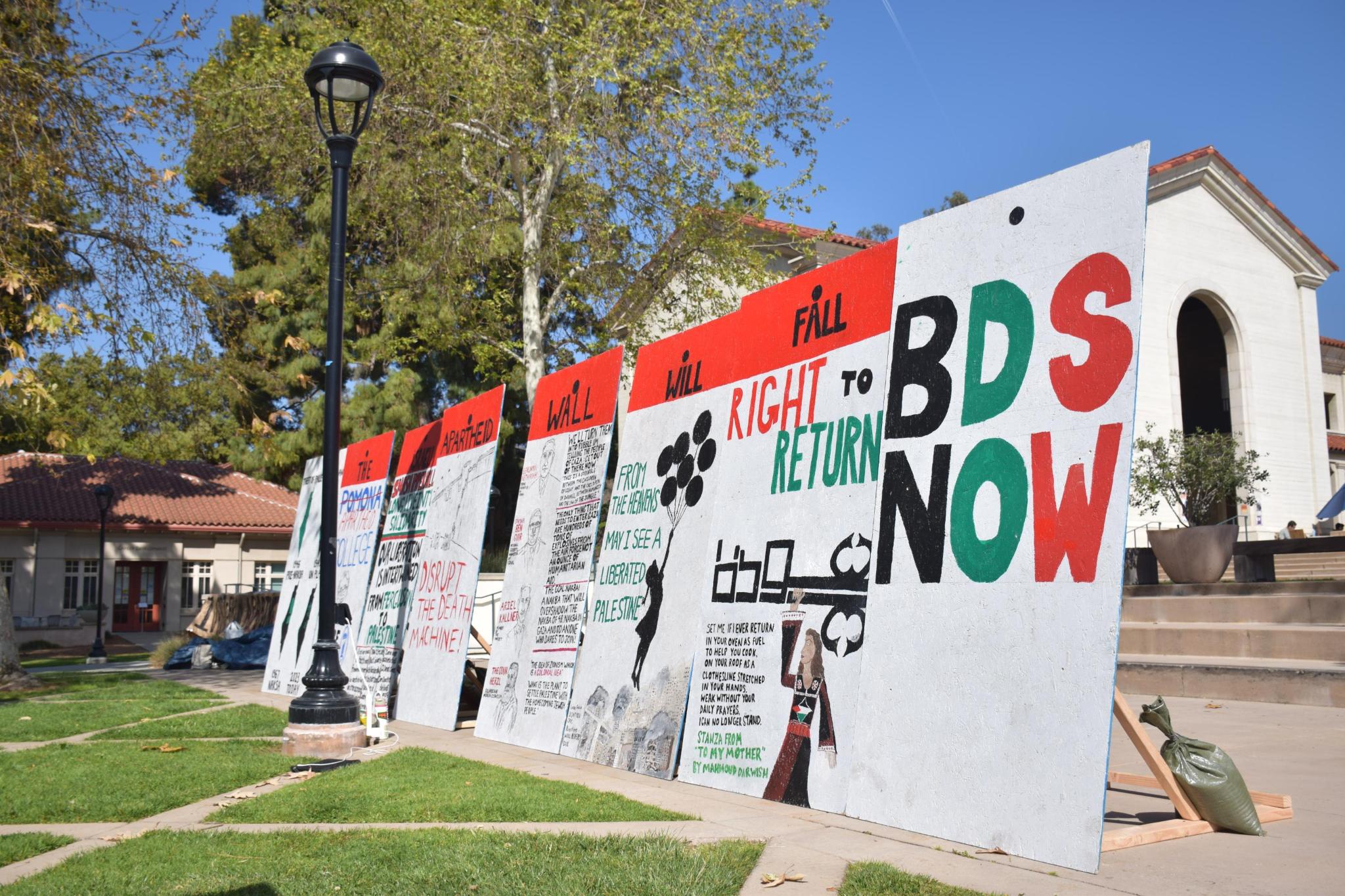
Palestine
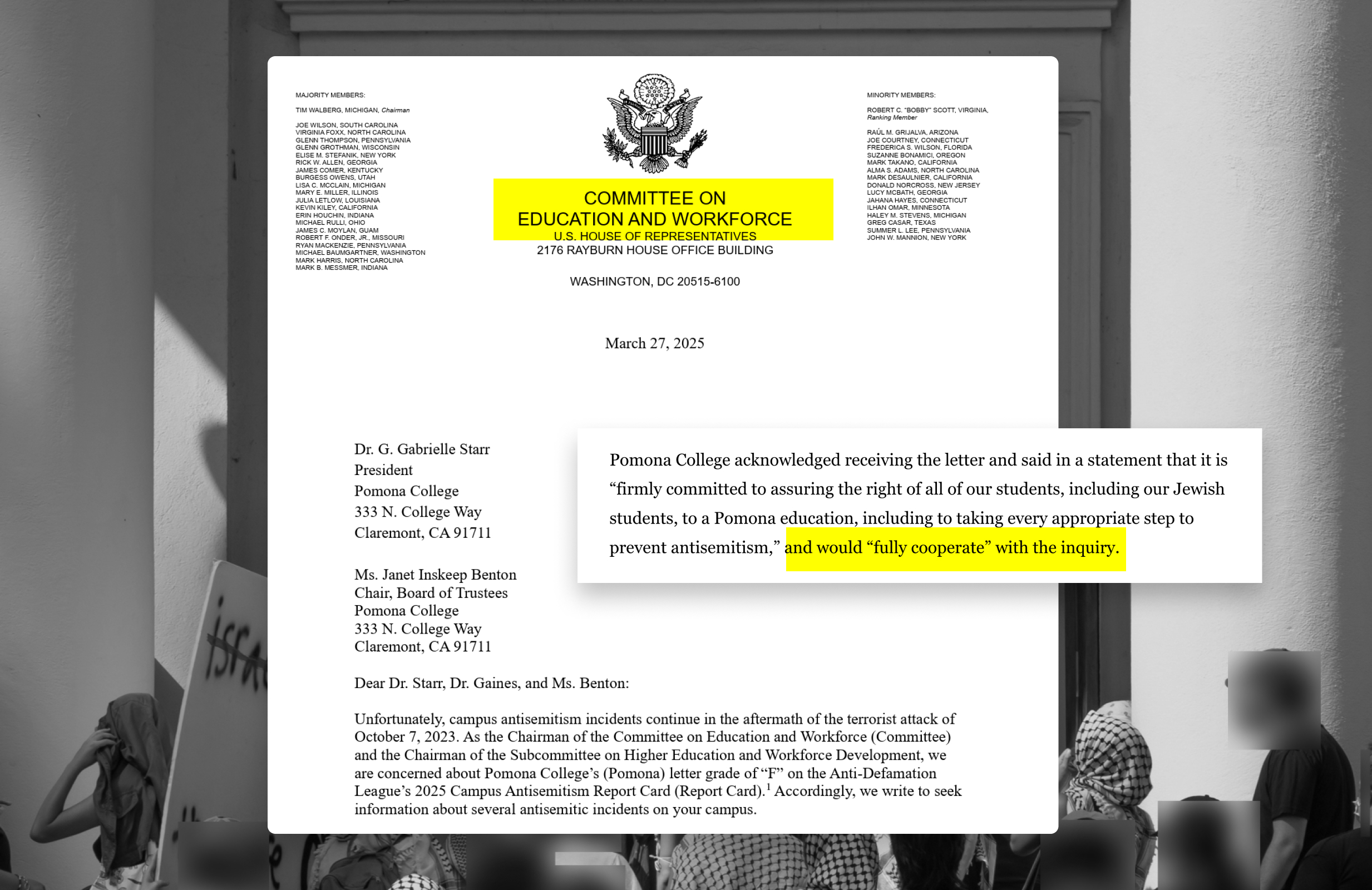
Palestine
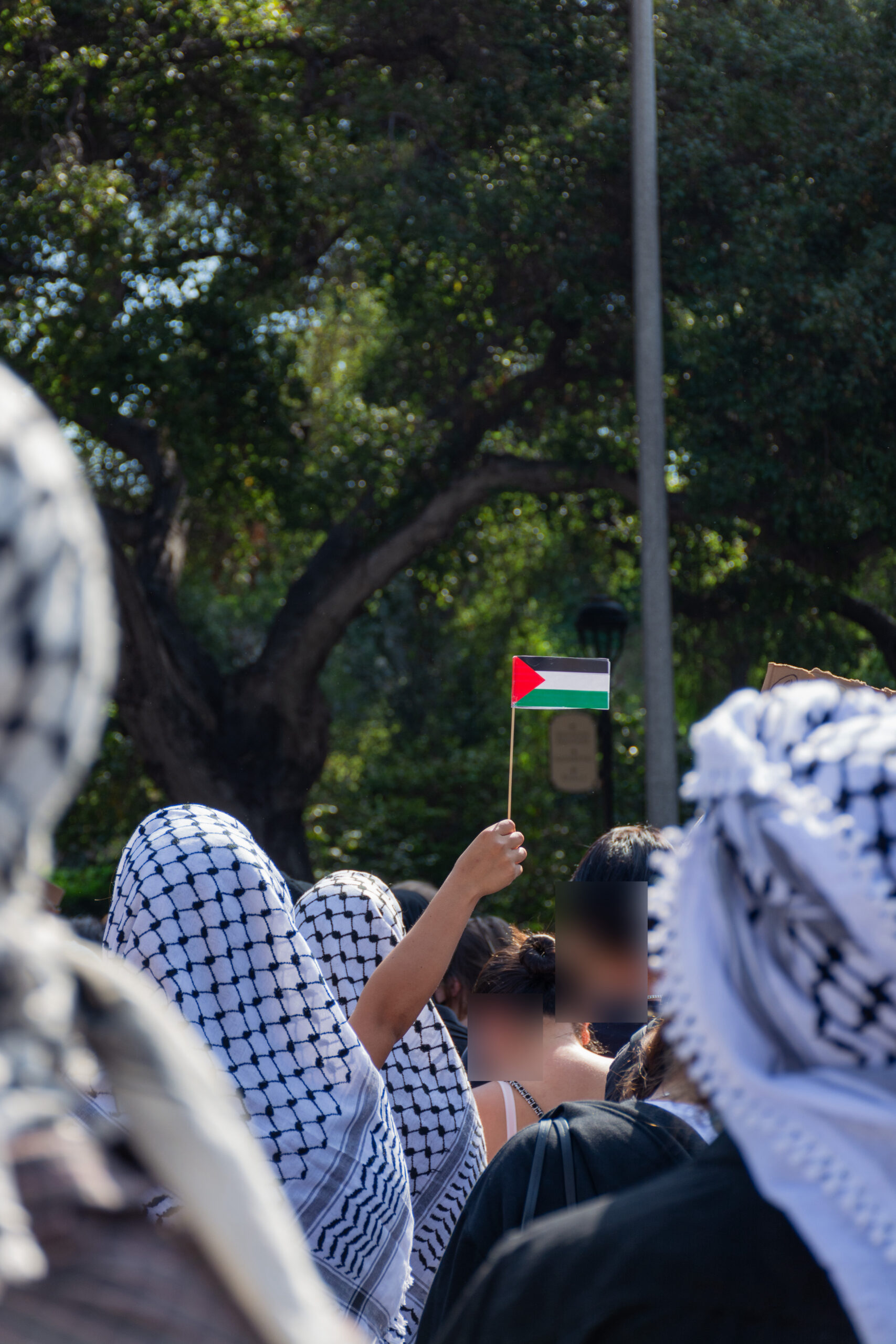
Palestine

Undercurrents reports on labor, Palestine liberation, prison abolition and other community organizing at and around the Claremont Colleges.
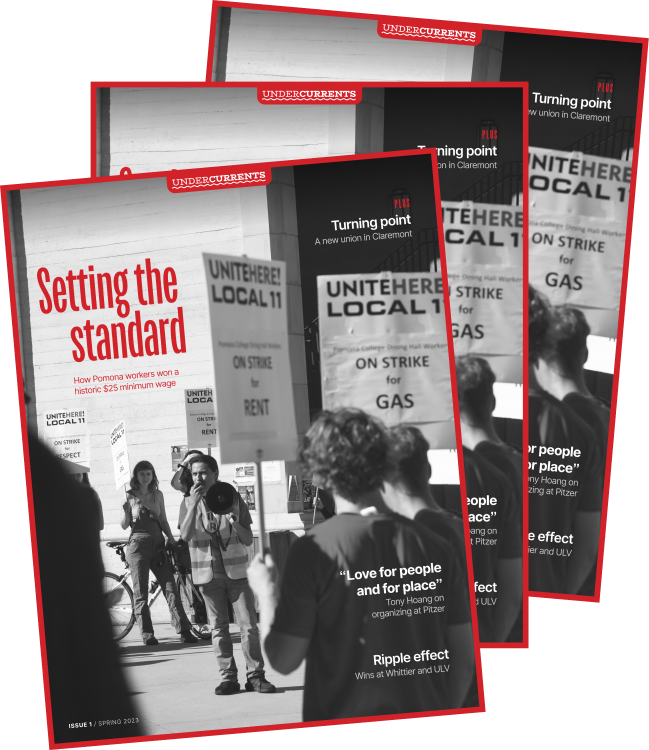
Issue 1 / Spring 2023
Setting the Standard
How Pomona workers won a historic $25 minimum wage; a new union in Claremont; Tony Hoang on organizing
Read issue 1